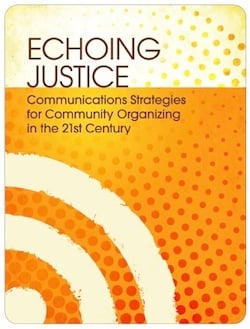Nearly 20 years ago, I sat in a meeting to discuss how we, progressives, might develop some real strategic communications support for our movement in the wake of what seemed to be an insurgent Right Wing. Early in President Clinton’s first term, Newt Gingrich seemed unstoppable. Clinton was moving further rightward and progressive opinion leaders argued about how oppositional to be towards Clinton initiatives like workfare and the crime bill–legislation that only a few years prior would have been unthinkable to be introduced by a Democratic President.
It felt as if I was in some version of the same meeting for at least ten years afterward, either with “progressive communicators” or communicators and funders. However, organizers—the people who move the work and make real the messaging—were never really in the room.
So, I stopped going to those meetings.
Fortunately, there were other gatherings where organizers and communicators were coming together and learning from each other. One stream of work that was incredibly influential for me was the way that public health advocates and strategic communicators were coming together to shape a work that was known then as media advocacy. Media advocacy blended some of the best science from mass communications studies and political science in order to focus the use of media to advance public health policy. Its early days resembled a kind of huge lab where advocacy and communications were becoming increasingly fluid and the victories in tobacco control, AIDS funding, and more seemed to indicate we were onto something useful and important.
About the same time, Charlotte Ryan and William Gamson were leading a stream of communications work that was even more grounded in a framework of organizer leadership and movement support. Participatory communications was the term they coined for this groundbreaking work that was turning the traditional paradigm of progressive strategic communications completely on its head. Their deep, long-term work with groups over the last 20-plus years directly countered much of the prevailing wisdom in “strategic” communications. They asserted: that organizers had the answers; communicators needed to listen and support their work and agenda; and that communications people weren’t experts, but facilitators that provided a space to draw out effective messaging from those doing the work. For those of us following this both revolutionary and common sense approach, we were inspired and forever changed.
It is this journey and so much more that gave birth to the Echo Justice Communications Collaborative (Echo Collaborative). The Echo Collaborative is a result of consistent questioning of the false boundaries between communications and organizing, while recognizing the historic role that not-so-strategic communications has played in undermining progressive change. In other words, while we recognize that organizing and communications are synergistic and must be done in ways that support transformative change, not all communications work actually supports this change.
This report seeks to explore and lift up emerging lessons, including just what kind of communications work supports organizing? How does “movement communications” look on the ground? And, what kind of commitments must be made by investors, practitioners and the field at large in order to finally build the kind of comprehensive movement infrastructure that this kind of strategic synergy requires?
We hope that this offering helps advance what has been a decades long conversation on how we as progressive movement makers move ever closer to the authentic synergy between organizing and communications that we all know real change requires. No panaceas. No big promises. Just the truth and lessons that emerge when we listen to each other, work together, and even win.
See the full report at http://centerformediajustice.org/echoing-justice/.
Did you enjoy this article?
We're in the middle of our annual fund drive, and this year we're building our own internal infrastructure for subscriptions, meaning more of every dollar pledged goes to fulfilling our mission. Subscribe today to support our work and be a part of Convergence's next evolution.
